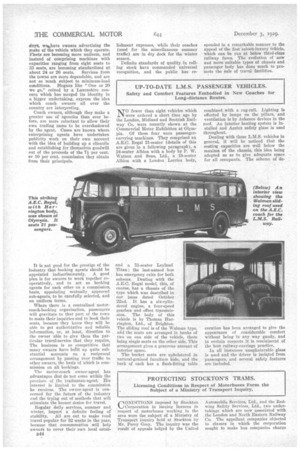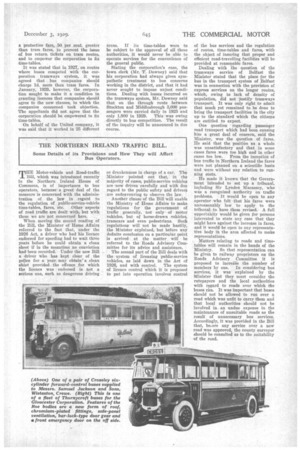PROTECTING STOCKTON'S TRAMS.
Page 70

Page 71

If you've noticed an error in this article please click here to report it so we can fix it.
Licensing Conditions in Respect of Motorbuses Form the Subject of a Ministry of Transport Inquiry.
CONDITIONS imposed by Stockton Corporation in issuing licences in respect of motorbuses working in the area were the subject of a Ministry of :Transport inquiry held at Stockton by Mr. Percy Grey. Thejinquiry was the 'result of appeals lodged by the -United
Automobile Services, Ltd., and the Redwing Safety Services, Ltd., two undertakings which are now associated with the London and North Eastern Railway Co. The appellant companies objected to clauses in which the corporation sought to make bus companies charge
a protective fare, 50 per cent. greater than tram fares, to prevent the issue of bus return tickets on tram routes and to empower the corporation to fix time-tables.
It was stated that in 1927, on routes where buses competed with the corporation tramways system, it was agreed that bus companies should charge 1d. more than tram fares. In January, 1929. however, the corporation sought to make it a condition in granting licences that companies should agree to the new clauses, to which the companies concerned took objection. The appellants did not agree that the corporation should be empowered to fix time-tables.
On behalf of the United company, it was said that it worked in 25 different areas. If its time-tables were to be subject to the approval of all these authorities, it would never be able to operate services for the convenience of the general public.
Stating the corporation's ease, the town clerk (Mr. T. Downey) said that his corporation had always given sympathetic treatment to bus concerns working in the district, and that it had never sought to impose unjust condi= tions. Dealing with losses incurred on the tramways system, Mr. Downey said that on the through route between Stockton and Middlesbrough 3,000 passengers were carried daily in 1925 and only 1,800 in 1929. This was owing directly to bus competition. The result of the inquiry will be announced in due course.




















































































































